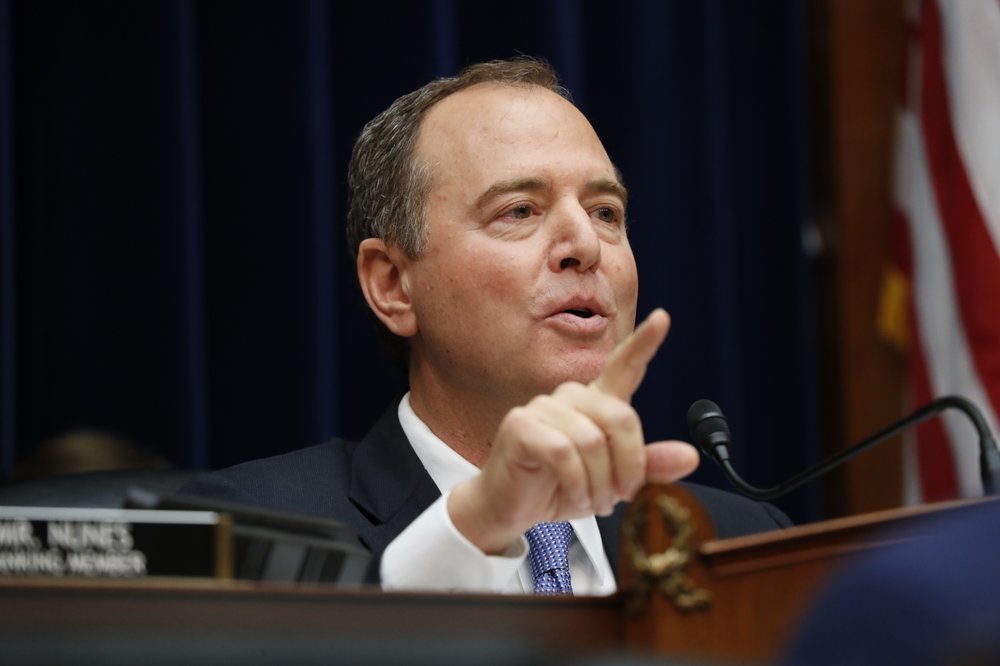
Of treason and civil war: An agitated Trump amps up threats
WASHINGTON (AP) — President Donald Trump, never one for understatement, is leaning into his threats as impeachment pressure mounts.
On Monday, he suggested Democratic Rep. Adam Schiff was guilty of treason. But the Constitution is clear that treason is not the same as disloyalty. And an agitated Trump was very publicly blurring the two as he tweeted against his critics and the House impeachment push.
Trump also suggested that any effort to oust him could lead to civil war, part of a weekend barrage of tweets that offered a window into his raw emotions.
Trump was anything but subtle in taking on Schiff, the chairman of the House Intelligence Committee and a longtime nemesis.
“Arrest for Treason?” Trump tweeted of the California Democrat. It was Trump’s latest objection to Schiff’s summation of a rough transcript in which the president on July 25 pressured Ukraine’s leader to investigate Joe Biden’s son.
A day earlier, Trump had groused: “I want Schiff questioned at the highest level for Fraud & Treason.”
Even presidents don’t always get what they want, by design.
It’s a bitter truth for the former real estate magnate who controlled much of his world before the presidency put him face-to-face with equivalent branches of government.
Trump has reacted by second-guessing critics and the Constitution, stonewalling information requests and venting against the government machine he calls “the deep state.”
The intensity of Trump’s tweets has been rising in tandem with a notable shift in public sentiment toward impeachment.
Polls conducted since the details of the Ukraine call went public show division over whether Trump should be impeached and removed from office, with support for impeachment growing significantly since the House launched the inquiry Sept. 24.
Trump went full-tilt.
Asked Monday whether he knows the identity of the whistleblower, he replied, “We’re trying to find out,” even though the person is protected by the Whistleblower Protection Act .
Earlier in the day, the president tweeted a comment by a conservative pastor that drew swift rebuke from a Republican member of Congress.
The president posted this comment from Rev. Robert Jeffress, pastor of the Southern Baptist megachurch First Baptist Dallas: “If the Democrats are successful in removing the president from office, it will cause a civil war like fracture in this nation from which our country will never heal.”
Republican Rep. Adam Kinzinger, a former Air Force pilot who represents an Illinois district Trump won in 2016, tweeted in response: “I have visited nations ravaged by civil war. ... I have never imagined such a quote to be repeated by a President. This is beyond repugnant.”
Trump has long saved the threat of treason for special perceived offenders, some that have never been proven to exist.
“My Campaign for President was conclusively spied on,” Trump falsely tweeted on May 17. “Nothing like this has ever happened in American Politics. A really bad situation. TREASON means long jail sentences, and this was TREASON!”
It wouldn’t be, even if it really had happened.
Likewise, Trump aimed his fury at the still-anonymous op-ed author who wrote in The New York Times just over a year ago that “many of the senior officials in his own administration are working diligently from within to frustrate parts of his agenda and his worst inclinations.” The writer described the president’s decision-making as “half-baked, ill-informed and occasionally reckless.”
“TREASON?” the president tweeted the same day, Sept. 5
Embarrassing, certainly, but not treason.
The Constitution states, “Treason against the United States, shall consist only in levying War against them, or in adhering to their Enemies, giving them Aid and Comfort.”
Note the word “only.”
Treason occurs when a U.S. citizen, or a non-citizen on U.S. territory, wages war against the country or provides material support — not just sympathy — to a declared enemy of the United States. The wording was derived from England’s treason statutes. In the United States, the executive branch can only bring charges in extremely limited cases.
Even gargantuan betrayals have not been deemed treason. Julius and Ethel Rosenberg, who were executed for giving atomic secrets to Russia during the Cold War, were charged with espionage.
Also not treasonous: the FBI official known as Deep Throat who undermined Richard Nixon’s presidency with his Watergate revelations.
___
AP Polling Director Emily Swanson contributed to this report.
___
Follow Kellman on Twitter at http://www.twitter.com//APLaurieKellman


 How to resolve AdBlock issue?
How to resolve AdBlock issue?